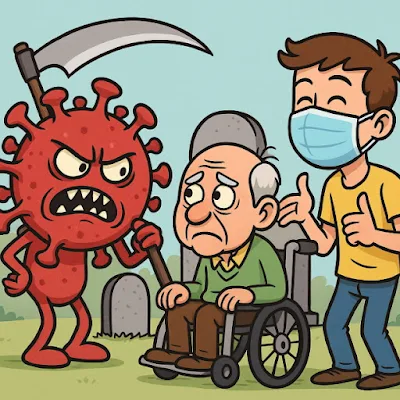Bad News About COVID-19
COVID-19 has flipped the world upside down. Scholars everywhere are passionately—some might say rabidly—announcing the arrival of an entirely new era. And those famous investment experts (yes, the same ones who didn’t see 2008 coming) are now warning of an incoming depression so massive it might make the Great Depression look like a clearance sale.
It’s an RNA virus, which means it mutates like a drama queen changes moods. It’s zoonotic, too—capable of infecting humans and animals alike. That means everyone’s a potential host, whether you walk on two legs, four, or have wings and echolocation.
Vaccines and treatments? Hard-won, yes. Guaranteed? Not so much.
We still haven’t figured out which creature served as the intermediate host between bats and humans. Pangolins? Raccoon dogs? Some are even whispering that this whole thing wasn’t entirely… natural. That maybe, just maybe, some mysterious group had a hand in creating and spreading it. Sounds like a bad movie plot—but here we are.
Meanwhile, American millennials and Gen Zs, with their signature lack of chill, have dubbed COVID-19 the “Boomer Remover.” In many places, young folks still scoff at the idea of wearing masks, as if saving others from viral death were some kind of fashion faux pas.
Boomers, by the way, are those born between 1946 and 1964—now in their late 50s to mid-70s. They’re the generation that grew up on post-war peace, prosperity, and uninterrupted air-conditioning. Their contribution to the world? A population explosion and the invention of the McMansion. They rode the economic wave like seasoned surfers, enjoying the most stable and prosperous era in human history. And now, as they near retirement (or pretend to), the economy is on fire, the climate is unraveling, and Gen Z can’t afford rent.
People aged 65 and over are considered the elderly. (Though they'd prefer "young at heart" or "classic edition.")
According to Korea's National Statistical Office, as of 2000, Korea had the lowest percentage of elderly among 12 major OECD countries. By 2050? Korea’s expected to be right near the top. Which is… something to look forward to, I guess?
As of May 8, 2020, in terms of COVID-related deaths, the leading countries were the U.S., U.K., Italy, Spain, France, and others.
Supporting aging populations has become one of the most quietly catastrophic national dilemmas. Nobody really wants to bring it up at dinner parties, but the math isn’t looking good.
Pensions are running dry, healthcare systems are strained, and governments are collectively scratching their heads while pretending they totally have a plan. Some countries’ pandemic responses were so sluggish and baffling, you’d be forgiven for wondering if they were trying to let the virus win.
For the elderly, the future doesn’t exactly sparkle. Even before COVID, many had limited social engagement. Now, it's as if someone hit the “solitary confinement” button. Their risk of death from infection is high, and even if they recover, long-term complications could make survival bittersweet. Those with savings and family might manage. But for the poor, the isolated, and the forgotten? It’s not just a crisis—it’s an invisible war.
Now, if we believe Google’s famous futurist Ray Kurzweil, by 2045 we might be able to swap out body parts like smartphone batteries—or upload our minds into the cloud and become forever-young avatars. Will that tech arrive in time for us? Maybe. Will we be able to afford it? Doubtful. But hey—one can dream.
“Death is life’s greatest invention.”— Steve Jobs
He really said that. And then he exited stage left. Personally, I’m not so sure I agree. But maybe, just maybe, in the not-too-distant future, being able to die peacefully—body and soul at ease—might become one of the last, precious luxuries of the human condition. Call it naive. Or hopeful. Or just the right kind of foolish.
Korean version: https://deposo.tistory.com/73






Comments
Post a Comment